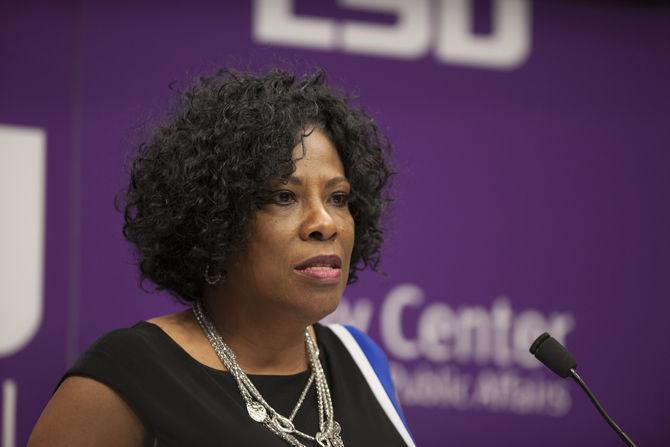Before it ever saw the Nov. 18 public ballot, Mayor-President Sharon Weston Broome’s “Better Roads and Transportation” tax was shut down on a 5-5 Metro Council vote, needing two more votes to pass. According to The Advocate, the property tax would cost homeowners between $50-$200 a year. Constituents said that drainage and public safety were more important to them than fixing infrastructure and traffic congestion.
Louisiana has a long history of voting down taxes it so desperately needs. The traffic lights are poorly timed, the minute amount of lanes cannot hold a city this size and there are potholes as far as the eye can see. Analysis from the Capitol Region Planning Commission determined that Broome’s tax proposal was to reduce “more than 1 million annual hours of delay for drivers across the parish,” The Advocate reported.
However, when a newly-elected government official wants to enact a policy that would change BR for the better, constituents turn the other way.
Disdain for the tax package comes from its imbalanced proposal, Jeffrey Welsh states. The Better Roads and Transportation proposal would be funded by a property tax, and as Welsh so eloquently put it, “Not all drivers own property and not all property owners drive,” The Advocate reports.
Hearing from these exuberantly solid arguments against the tax package, it is obvious the negative stigmatism against taxes in Louisiana is less logistically-based and instead morally-based. Maybe not all homeowners drive cars, but, even if said civilians walked, biked or took the bus to work, they would still be using roads. Anti-socialist sentiments are a prevalent part of our culture because the thought of a common good is sinful to constituents.
Arlie Russell Hochschild wrote a book on how these anti-tax ideals are a paradox in practice, specifically focusing her studies in Lake Charles, Louisiana. The New York Times’ headline for her book’s review reads: “Why Do People Who Need Help From the Government Hate It So Much?”
This capitalistic-loving culture has a huge problem — many of these same people who believe in a “successful business man” making America “great again” could actually benefit from statewide support. Though these constituents would like to believe in the “top one percent” dogma, none of them are a part of it.
Economically-conservative folks cannot dream of approving taxes if it doesn’t benefit them specifically in the highest returns. Metro Councilwoman Chauna Banks stated she “could not support the plan because of its lack of projects in her district,” the Advocate reports. Like many of her constituents, Banks left the building early and did not vote on the tax package.
Another reason Louisiana voters refuse to approve taxes is simple: we historically elect crooks who cannot spend our taxes transparently. Greater Baton Rouge Business Report’s J.R. Ball said it best: “If we’ve learned anything from the fortnight debate over our unwillingness to support new taxes for road construction it’s this: An alarmingly high number of Baton Rouge residents have exactly zero trust in the people running our metropolitan form of government.”
In a comparison study between tax distribution in Texas and Louisiana, Stephanie Riegel states: “Where the difference comes is in what Texas gets for its money, and it certainly appears to get more. Better roads. Better schools. Better health outcomes. This, in part, is due to the difference in the way the state government is structured.”
Riegel goes on to claim that the Texas government’s decentralized system works better: there are clear lines between local and state policies, whereas in Louisiana, the majority of power stays in the capital city.
So, though the legislature of Louisiana has a historically unhelpful past, there is hope for the future. Mayor-President Broome clearly wants to improve our infrastructure, and our next hurdle as Louisiana residents relies in our own beliefs. In the words of Alcoholics Anonymous, “the first step is admitting you have a problem.” And until we do that, Louisiana, we’ll keep running into another bump in the road.
Kate Roy is a 19-year-old mass communication sophomore from Lafayette, Louisiana.
Opinion: Louisiana’s disapproval in state taxes unparalleled to its needs
By Kate Roy
September 30, 2017
Mayor-President Sharon Weston Broome speaks about racial issues in the Baton Rouge community on Wednesday, April 19, 2017 in the Holliday Forum.





